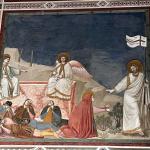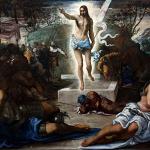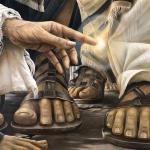ELIZABETHANS AND GREECE
Today, many view ancient Greece, and especially ancient Athens, as the fountainhead of Western civilization. This was not the case for medievals, who knew Greek literature in Latin translations. Though Chaucer set some of his works in ancient Greece (?The Knight?s Tale?E Troilus and Criseyde ), he was not a deep student of classical civilization or literature. Dittos for Elizabethans, who saw Rome as the nearer ancestor than Greece. As David Gress says (in From Plato to NATO), classical scholarship was born in the eighteenth century, and took root in England and especially Germany as an ?ersatz religion?Eand a ?replacement for Christianity.?E
Yet, the Renaissance did involve a resurgence of interest in ancient Greece. We need only think of Dante, whose Comedy is populated by Greek philosophers, poets, and fictional characters. And the English Renaissance participated in this revival. This is evident in several ways (drawn from Gilbert Highet?s The Classical Tradition and Lewis?s English Literature in the Sixteenth Century ).
First, the Renaissance was a great age of translation. In 1611, George Chapman (made famous by Keats?s poem) produced the first complete English translation of the Iliad taken from the Greek, and by 1614 had produced a translation of the Odyssey . Parts of Herodotus had been translated in 1584, and Thomas Nichols translated Thucydides (from a French translation) in 1550. English translations of Plato and Aristotle also appeared in the 16th century, as well as a very few Greek plays.
Second, with respect to drama in particular, the Renaissance saw a renewal of theater as such. During the Middle Ages, Greek and Roman drama fell into obscurity, and a wholly new dramatic tradition grew up around liturgical events of the medieval church. During the Renaissance, classical drama was revived, and classically-influenced theaters were built. The specific influences on Shakespeare were more from Roman drama than from Greek, however.
Third, Shakespeare himself set a number of works in ancient Greek settings: Venus and Adonis , Timon of Athens , A Midsummer Night?s Dream , Troilus and Cressida , and Pericles . The Comedy of Errors is taken from Roman adaptations of Greek plays. Most of these works are set in legendary or mythological Greece, and the plays do not explore Greece in the way Shakespeare?s Roman plays explore Rome and Romanness. Still, Shakespeare?s portrayal of the Greek heroic world and its values in Troilus and Cressida does give us some insight into his assessment of that world and those values.
TROILUS IN EUROPEAN LITERATURE
Troilus is mentioned very briefly in the Iliad , in a single line in which Priam laments the deaths of his sons (24.253-62). Virgil filled in the story somewhat ( Aeneid 1.474-8), and the story of his death is told throughout the middle ages. The first mention of Cressida and of the love affair with Troilus comes in the 12th-century Roman de Troie , a ?romance?Eversion of the Trojan war.
Prior to Shakespeare, the greatest treatment of the story in English comes from Chaucer, who wrote a book-length poem Troilus and Criseyde , based on Boccaccio?s Filostrato . In typical medieval fashion, Chaucer finds a moral at the end of the tale, and organized the whole poem to bring out the contrast of carnal and celestial love. Later poets also tried their hand at the story. Dryden produced a bowdlerized version of Shakespeare?s play, which one critic has described as a play ?advertised as a tragedy and quite unintentionally comical.?E
The love story as Shakespeare tells it is as follows: Troilus and Cressida are lovers living in Troy in the seventh year of the Greek siege of the city. Through the machinations of Cressida?s uncle Pandarus, they are able to spend a night together. Cressida?s father, the Trojan priest, Calchas, has defected to the Greeks, and he asks the Greeks to arrange an exchange of prisoners, bringing Cressida to the Greek camp to be reunited with her father. Once in the Greek camp, Cressida quickly gives herself to Diomedes, while Troilus watches from hiding.
Surrounding this love story is the story of the Trojan War. Greeks and Trojans both meet in council to decide what to do. Ulysses recognizes that Achilles?Eabsence from the battle is the cause of the Greek weakness, and he intends to provoke Achilles to come back to the field by choosing Ajax as the Greek champion in a single combat with Hector. That fight ends inconclusively, with Hector and Ajax recognizing that they are kin. After Cressida is taken to the Greek camp, Hector returns to the battlefield, in spite of Achilles?Ethreats and Cassandra?s warnings, and is killed. The play ends with the Trojans mourning their fallen hero.
A WHORE AND A CUCKOLD
We cannot offer a full analysis of Shakespeare?s play here. But several issues may be highlighted. First, Shakespeare has radically deflates the heroic characters and events of Homer?s epic. The Prologue promises great and heroic action, using language that parodies the elevated language of Shakespeare?s contemporaries (Prologue, 1-31). But the play is filled with talk, talk, talk about why the war is at a stalemate (1.3; 2.2), rather than the epic action that the Prologue promises. In the final battle with Hector, Achilles sends his men to attack the Trojan hero while he?s unarmored, taking a rest (5.8).
Love is treated no better. Helen is a silly ditz who, with Paris, thinks of nothing but love (3.1.101ff), and Cressida all too quickly accepts Diomedes (5.2). Pandarus?Eclosing speech is in a similar vein, addressing the audience as ?traitors and bawds?Eand ending by bequeathing ?my diseases?Eon the audience (5.10.35ff). Honor is also demystified, as Hector first argues that continuing the war is wrong and then agrees to continue to protect his dignity (2.2.164ff).
At the center of this deflation is Thersites, Ajax?s slave, whose comments on the characters and action are often taken as the playwright?s own. He describes the Greek heroes as ?patchery, juggling, knavery,?Eand reduces the Trojan war to a marital dispute: ?All the argument is a whore and a cuckold?E(2.3.70-74). Achilles is ?idol of idiot-worshipers?E(5.1.7). It has been popular in recent years to take Thersites?Eassessment as the point of the play. This is hardly the case, for Thersites is not presented as a likable, convincing character. Yet, it?s clear that Shakespeare does not stand in awe of his material, and is detached enough to see that the great epic of the ancient world is, from one angle, nothing but tawdry ?war and lechery?E(2.3.74).
Humanity as depicted in the play is bent on suicide, using ?honor?Eas a disguise for violence and revenge, ?love?Eas a cover for lust and whoredom. Humanity is cannibalistic, ruled ?appetite, a universal wolf?Ethat must eventually eat up itself (1.3.119-124; 3.1.155)
Yet, second, Shakespeare should not be understood as a cynic or a sheer pessimist. He does not mock Troilus?Elove, or reduce it to mere lust (as Thersites would). Troilus is, by his own admission, a ?giddy?Elover, ?whirled?Eby his expectation yet fearful that consummation will not live up to his hopes (3.2.16-27). Yet, there can be no doubt that his love is genuine. Cressida, too, is in love with Troilus, though she shrewdly recognizes that women once won are expendable (3.2.113ff). Feminist critics are probably correct to see her submission to Diomedes as something forced on her by her helpless circumstance; she can either be a strumpet for the whole Greek camp (see 4.5.18ff), or attach herself to one man.
Finally, one of the key themes in the play, and in much of Shakespeare?s other work, is time and mutability. Time dissolves both honor and love; over time, great deeds are forg
otten, and lovers lose their earlier passion for one another. This runs through the play, but by far the most famous statement of it is a speech of Ulysses in 3.3.145: In response to Achilles?Eoffended question, ?What, are my deeds forgot??EUlysses describes how time devours the good deeds ?as fast as they are made.?E Time produces divided selves: Troilus is ?not himself,?Eand Cressida is divided between ?Troilus?ECressida?Eand ?Diomed?s Cressida.?E
Possibly, Ulysses?Eother famous speech, on ?degree,?Egives an indication of the proper response to mutability: Hierarchy, order, degree are fortresses against humanity?s chaotic and suicidal tendencies (1.3.78ff). When degree is vizarded and undermined, love, honor, constancy, and even identity die with it.















